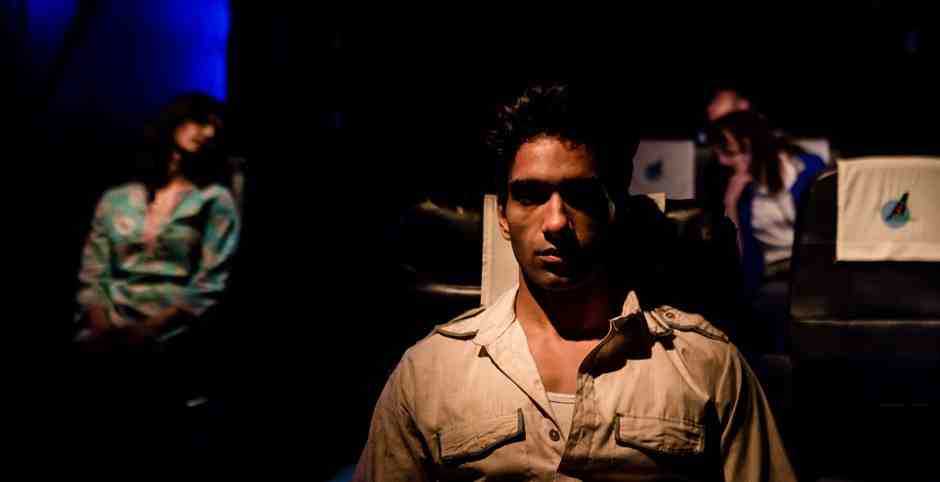@ Traverse Theatre, Edinburgh, until Sat 19 March 2016
The current migrant crisis has been likened to the Exodus from Egypt thousands of years ago. Unlike depictions of the Bible story, our current emergency is more urgent, more desperate than we can imagine. And maybe too enormous to deal with in the theatre too.
Writer/directors Hannah Barker and Lewis Hetherington have concentrated on one event to show the risks refugees are willing to take to flee oppression, and how we in the privileged West react. Andy lives in well-off Richmond under the Heathrow flight path. In the B&Q car park a body falls from the sky and lands at his feet. The victim is an Indian refugee escaping the slave labour conditions (surrendered passports, 14-hour days) of Dubai’s construction boom by hiding in the landing gear of a Boeing 777.
The story is told from the perspectives of the stowaway (in Dubai and growing up in India), his sister, the traumatised witness and his wife, and an author of thrillers who was in the plane at the time. Andy and the author meet. Does she not have a duty to discover what happened to the man who died and write about it? This busy play covers a lot of ground – from middle-class guilt to the atrocious conditions of the builders of Dubai’s glittering, soulless skyline; of the rights and wrongs of India’s space programme; the so-called “connectedness” of a globalised world; and post-colonialism.
‘Lots of horrible things happen in the world. You can’t let them all in [to your head],’ cautions Andy’s wife. The same might be said of the audience. A judicious trim of the themes might be in order.
On a clever set (designed by Rhys Jarman) that doubles as jet plane and building site, an excellent cast of four (Devesh Kishore, Steven Rae, Balvinder Sopal and Hannah Donaldson) play a variety of roles. But it’s the story of the impetuous Adi and his sister Salma, growing up in fast-changing, money-hungry India and his increasingly urgent phone calls home, where the play truly catches light. (There should have been more of this). She tells him not to do anything stupid, and he admits that that may be more difficult than returning home a rich man.
Stowaway is produced by Analogue Theatre which famously specialises in stories from real life. That’s tricky even for newspapers and TV news which are often criticised for skewing their reporting. But Stowaway is a gripping one-and-a-half-hours of theatre, with a terrific soundscape by Philip Pinsky of the white noise of voicemail, PA announcements and mobile phone jingles, that reveals how the battery of everyday electronic distractions make it so hard to see the bigger picture. And although the plot can be a little contrived in places, it’s an important story told well.
